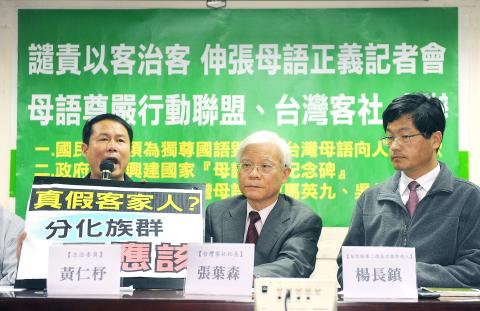Leaders from local Hakka groups yesterday slammed former Chinese Nationalist Party (KMT) chairman Wu Po-hsiung (吳伯雄) for calling Democratic Progressive Party (DPP) Chairperson Tsai Ing-wen (蔡英文) a “pseudo-Hakka” and demanded that the KMT apologize for what they called its past policy of “linguistic genocide.”
Representatives from various groups and two DPP legislative candidates in Hakka constituencies demanded that Wu — a Hakka — and President Ma Ying-jeou (馬英九), who doubles as KMT chairman, apologize for the party’s suppression of languages other than Mandarin during the Martial Law era.
They also called for the establishment of a native language monument to remind Taiwanese of the long period of suppression in Taiwan.

Photo: Liao Chen-huei, Taipei Times
“Ma and Wu should be ashamed of themselves for being accomplices of the suppression, a serious crime against humanity,” Taiwan Hakka Society chairman Chang Yeh-shen (張葉森) said.
The leaders held the press conference in response to comments by Wu, who told a rally in support of Ma’s re-election campaign on Sunday that Tsai was a “pseudo- Hakka” because she could not speak Hakka and had not spoken it in more than 50 years.
Many people are not able to speak their mother tongue, such as Hakka, Hoklo (also known as Taiwanese) or any of the Aboriginal languages because the KMT only promoted Mandarin and prohibited the use of other languages for decades, Chang said.
In 1988, Wu, who served as minister of the interior and was regarded as a top Hakka politician at the time, and then-Cabinet member Ma did nothing to assist a Hakka awareness movement that had emerged that year and did not stop the KMT from the “Nazi-like” suppression of native languages and cultures, Chang said.
“It is ironic that now Wu is accusing people of not speaking fluent Hakka and Ma is busy telling people that he is Hakka, when he is not,” Chang said.
What really matters to Hakka, the second-largest ethnic group in Taiwan behind Hoklo, is whether a candidate is committed to promoting Hakka culture rather than his or her language proficiency, said Yiong Cong-ziin (楊長鎮), a DPP legislative candidate in Miaoli County.
“Ma, Wu and the KMT should look themselves in the mirror and think hard about why [Taiwan] was able to preserve Hakka and Hoklo during the Japanese colonial period [from 1895 to 1945], but it almost failed to survive the Martial Law period,” he said.
Huang Jen-shu (黃仁杼), a DPP legislative candidate in Taoyuan County, said several factors could contribute to or impair one’s Hakka proficiency, adding that lack of language proficiency should never be regarded as a “cardinal sin.”
Huang said that if Wu failed to apologize for his comments, he did not rule out organizing a protest in front of KMT headquarters.
The KMT would be the last political party to brag about its contribution to Hakka people, Taiwanese Hakka Association of the World chairman Peter Lo (羅能平) said.
“From what I’ve seen, the DPP established the Council for Hakka Affairs and the Hakka Television Service and it was committed to promoting cultural diversity during its eight years in power, while the KMT has done nothing in the past six decades,” Lo said.

MAKING WAVES: China’s maritime militia could become a nontraditional threat in war, clogging up shipping lanes to prevent US or Japanese intervention, a report said About 1,900 Chinese ships flying flags of convenience and fishing vessels that participated in China’s military exercises around Taiwan last month and in January last year have been listed for monitoring, Coast Guard Administration (CGA) Deputy Director-General Hsieh Ching-chin (謝慶欽) said yesterday. Following amendments to the Commercial Port Act (商港法) and the Law of Ships (船舶法) last month, the CGA can designate possible berthing areas or deny ports of call for vessels suspected of loitering around areas where undersea cables can be accessed, Oceans Affairs Council Minister Kuan Bi-ling (管碧玲) said. The list of suspected ships, originally 300, had risen to about

DAREDEVIL: Honnold said it had always been a dream of his to climb Taipei 101, while a Netflix producer said the skyscraper was ‘a real icon of this country’ US climber Alex Honnold yesterday took on Taiwan’s tallest building, becoming the first person to scale Taipei 101 without a rope, harness or safety net. Hundreds of spectators gathered at the base of the 101-story skyscraper to watch Honnold, 40, embark on his daredevil feat, which was also broadcast live on Netflix. Dressed in a red T-shirt and yellow custom-made climbing shoes, Honnold swiftly moved up the southeast face of the glass and steel building. At one point, he stepped onto a platform midway up to wave down at fans and onlookers who were taking photos. People watching from inside

Japan’s strategic alliance with the US would collapse if Tokyo were to turn away from a conflict in Taiwan, Japanese Prime Minister Sanae Takaichi said yesterday, but distanced herself from previous comments that suggested a possible military response in such an event. Takaichi expressed her latest views on a nationally broadcast TV program late on Monday, where an opposition party leader criticized her for igniting tensions with China with the earlier remarks. Ties between Japan and China have sunk to the worst level in years after Takaichi said in November that a hypothetical Chinese attack on Taiwan could bring about a Japanese

The WHO ignored early COVID-19 warnings from Taiwan, US Deputy Secretary of Health and Human Services Jim O’Neill said on Friday, as part of justification for Washington withdrawing from the global health body. US Secretary of State Marco Rubio on Thursday said that the US was pulling out of the UN agency, as it failed to fulfill its responsibilities during the COVID-19 pandemic. The WHO “ignored early COVID warnings from Taiwan in 2019 by pretending Taiwan did not exist, O’Neill wrote on X on Friday, Taiwan time. “It ignored rigorous science and promoted lockdowns.” The US will “continue international coordination on infectious